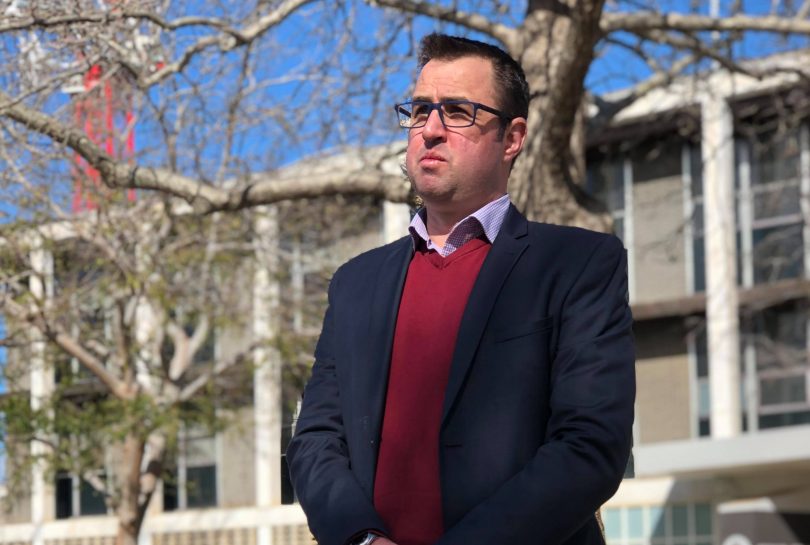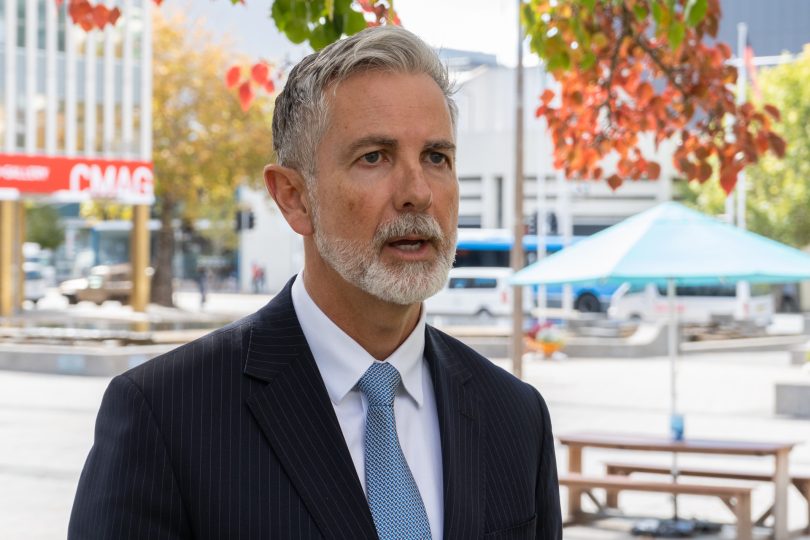
Former AFP Sergeant Jason Taylor was assaulted while on duty in January 2020. Photo: Region Media.
The Canberra Liberals want to make it tougher for anyone who assaults a frontline emergency services worker to get bail after officers like Jason Taylor were left scarred and their attackers walked free.
Mr Taylor, a former AFP Seargent, was choked from behind when trying to make an arrest in January last year. He took six months off before attempting to go back to work, still suffering from post-traumatic stress disorder and anxiety.
Mr Taylor resigned last month after 14 years of service after experiencing a mental breakdown and being admitted into a health facility when it became too much.
The man who choked him from behind didn’t spend a day in prison, despite being convicted of the offence, Mr Taylor said.
“I loved my job. I was very good at it,” he said. “This incident was not the only issue, but it was certainly the trigger that caused a lot of issues I have had since that.
“There was no justice, and I felt that the only person that has been punished is me.
“I have navigated this system for the entirety of my policing career and so I am not surprised by poor decisions from the courts and a lack of support from the government, but this was the first time I had experienced that personally.”
The new laws, proposed by Shadow Police Minister Jeremy Hanson, would decrease the likelihood of people like Mr Taylor’s attacker being granted bail by adding assaulting a frontline community service provider to the list of offences to which a presumption of bail does not apply.

Shadow Police Minister Jeremy Hanson has introduced a new bill to protect frontline officers. Photo: Dominic Giannini.
There are three levels of bail when an offence is committed: the presumption for bail, no presumptions towards bail and the presumption against bail for the most serious offences, including murder and its ancillary offences.
The bill does not make a rejection of bail mandatory and discretion will remain with the courts.
Mr Hanson said workers were tired of seeing repeat assaults from people who are out on bail. The new measure would help deter potential attackers.
“It takes a terrible toll on our frontline workers, and they deserve better,” he said. “We need to send that message of, if you assault a police officer or frontline service providers, there are significant consequences for that.”
Emergency Services Minister Mick Gentleman said he was supportive of anything that helped protect frontline workers but did not give in-principle support for the bill, although he said the government would consider it. The debate was adjourned after its introduction by Mr Hanson last week (5 August).
Mr Hanson remained hopeful that the government would support the changes after introducing new offences last year.
Driving at police and damaging a police vehicle carries a maximum prison sentence of 15 years and five years, respectively. Assaulting a “frontline community service provider” carries a maximum of two years in prison.
Mr Hanson said the number of people who would be covered by his new bill is not known as police do not collect official data about offences committed by people on bail.





















